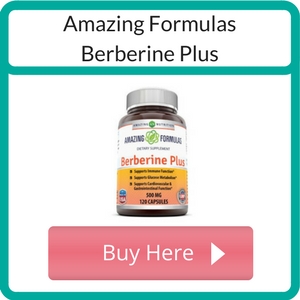Is Berberine Antifungal?
Is Berberine Antifungal?
Berberine is a type of salt found in different plants, such as barberry, turmeric tree, and goldenseal. It has grown in popularity in recent years and is considered an effective supplement for yeast infection.
In this article I’ll look at the scientific evidence for its antifungal properties, I’ll tell you what health benefits it offers and what can be its effects. I’ll also recommend the best berberine supplements on the market, so keep reading!

What is the Scientific Evidence Behind Berberine?
Many studies have shown that berberine coupled with a reduced dosage of antifungal drugs such as fluconazole or terbinafine is more effective against Candida than a higher dosage of these drugs on their own.
Other studies also found that berberine on its own can fight not only Candida albicans (the most common species causing yeast infection) but also Candida species resistant to fluconazole (Diflucan) such as Candida tropicalis.
What are the Best Berberine Supplements?
Amazing Nutrition Berberine Plus 500 mg 120 Capsules
This supplement comes with 120 easy to swallow, gluten-free capsules. Each capsule contains 500mg of berberine, so it’s easy to make sure you take your recommended daily dosage of 1500mg.
I like the fact that it contains only natural ingredients, making it easier for your body to digest it without causing any side effects.
Ingredients: 500mg Berberine HCI, Rice Flour, Microcrystalline Cellulose 102, Magnesium Stearate (Vegetarian), Gelatin
Metagenics Candibactin-BR
This supplement has been designed especially to help you fight Candida. Apart from 400mg of berberine, it contains other herbs with proven antifungal properties, such as ginger and Coptis rhizome.
It works not only for Candida overgrowth but also balances the levels of intestinal bacteria. CandiBactin contains only natural ingredients, it comes with 180 vegetarian and gluten-free tablets.
Ingredients: Coptis Root & Rhizome 12:1 Extract (containing berberine), Oregon Grape Root 4:1 Extract, Berberine HCI†, A 4:1 Proprietary Extract of Coptis Root & Rhizome, Chinese Skullcap Root, Phellodendron Bark, Ginger Rhizome, Chinese Licorice Root, Chinese Rhubarb Root & Rhizome. Other Ingredients: Microcrystalline cellulose, croscarmellose sodium, silica, stearic acid (vegetable), magnesium stearate (vegetable), and coating (hypromellose, medium chain triglycerides, and hydroxypropyl cellulose).
What are Other Health Benefits of Berberine?
Berberine offers an array of health benefits, the best-documented ones are:
- It can lower blood sugar in people suffering from diabetes
- It reduces your blood cholesterol
- It helps heal burns
- It can improve symptoms and death rate of those suffering from congestive heart failure
- Improves blood platelet count
- Improves blood pressure and blood flow in metabolic syndrome sufferers
- It can reduce symptoms of hepatitis and liver disease
- Heals osteoporosis
- It speeds up diarrhea recovery

- Helps with weight loss
- Reduces injuries caused by radiation therapy
- Reduces polycystic ovary syndrome symptoms
- It relieves symptoms of glaucoma by reducing eye pressure as well as trachoma, another eye disease that causes blindness
- It can heal stomach ulcers caused by Helicobacter pylori
- Reduces menopausal symptoms
How to Take Berberine?
Berberine is usually taken 3 times a day in 500mg doses. As it has a strong effect on your blood levels, it’s important to wait for a few hours before taking your next dose.
If you’ve got a medical condition, such as diabetes or a cardiovascular disease, or you’re taking any medication, you have to speak to your doctor before starting to take berberine as it may interact with different drugs.
What are Berberine Side Effects?
As long as it’s taken following manufacturers instructions, berberine is considered very safe, however, it can occasionally cause stomach issues such as cramping, diarrhea, and constipation.
Conclusion
So is berberine antifungal? Definitely. Berberine is an effective antifungal supplement recommended for Candida overgrowth sufferers. In my opinion, instead of taking in on its own, it’s best to combine it with other antifungal herbs for a more potent effect.
Candibactin and other Candida supplements containing berberine are a great option. If you want to learn more about using natural remedies for Candida, check my articles about:

Have you used berberine for a yeast infection? I’d like to hear about your experiences. Please use the comment section below to share your stories and questions.


